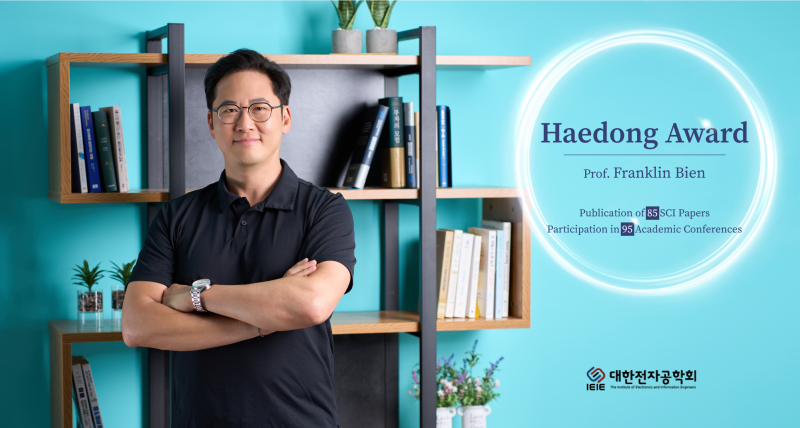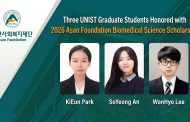Franklin Bien, a professor of Electrical Engineering at UNIST, has been honored with the prestigious Haedong Award, the highest recognition in the field of electronic engineering in Korea. This marks the second time that the award has been bestowed upon a member of the Bien family, following in the footsteps of his late father, the esteemed Professor Emeritus Zeungnam Bien at KAIST.
The Haedong Award acknowledges individuals who have made significant contributions to the advancement of science and technology in the fields of electronics, information, and communication engineering. It is presented by the Haedong Science and Culture Foundation, which is founded by the late Chairman Jungsik Kim of Daedeok Electronics Co., Ltd. The award is categorized into academic, technological, and young scientists, and winners are selected by the Institute of Electronics and Information Engineers (IEIE).
Professor Bien has been recognized for his exceptional achievements in integrated circuit design. His extensive research has resulted in the publication of 85 SCI papers and participation in 95 academic conferences. His research spans various areas, including CMOS-based analog circuits, biomedical micro-systems, wireless power transmission systems, and power management ICs. His work has also received substantial recognition at home and abroad, with an impressive 5,497 citations, as well as 225 domestic and international patents.
Professor Bien has been recognized for his exceptional achievements in integrated circuit design. His extensive research has resulted in the publication of 85 SCI papers and participation in 95 academic conferences. His research spans various areas, including CMOS-based analog circuits, biomedical micro-systems, wireless power transmission systems, and power management ICs. His work has also received substantial recognition at home and abroad, with an impressive 5,497 citations, as well as 225 domestic and international patents.
Notably, Professor Bien’s contributions extend beyond research accomplishments, as he actively pursues the commercialization of his technology. One notable example is the development of an electromagnetic wave-based biosensing system, which combines a contactless sensor and an IC chip, capable of detecting sleep apnea. With plans for mass production underway, this innovation is hailed as a significant advancement in the digital medical field related to sleep technology.
This recognition holds special significance as Professor Bien follows in the footsteps of his late father, Professor Emeritus Zeungnam Bien, who was also honored with the Haedong Award in 2002. Professor Emeritus Bien, known as a pioneer in intelligent robot development in Korea, introduced the first domestic robot arm, KAISEM, in 1979 and contributed to the advancement of intelligent robotics through the application of fuzzy theory.
Expressing his gratitude, Professor Bien stated his commitment to prioritize the societal impact of technology and explore new research frontiers. He noted, “Following in the footsteps of my father, who has always considered prioritizing the societal impact of technology and boldly pioneered new research fields, I am committed to commercializing research and technology that can enhance human welfare and improve the quality of life.”
The award presentation ceremony is scheduled to take place at the Grand InterContinental Seoul Parnas on December 6, 2023.







![[2026 UNIST Matriculation] “Design Questions the World Has Never Seen!”](https://news.unist.ac.kr/wp-content/uploads/2026/02/사진-박종래-UNIST-총장이-2026년-입학식사를-전하고-있다-1-1-190x122.jpg)
![[2026 UNIST Commencement] “Become Way Makers Who Open Paths Where None Are Drawn!”](https://news.unist.ac.kr/wp-content/uploads/2026/02/사진-박종래-총장이-UNIST-학위수여식사를-전하고-있다-3-1-190x122.jpg)
![[2026 UNIST Commencement] Voices of Class of 2026](https://news.unist.ac.kr/wp-content/uploads/2026/02/Untitled1-190x122.jpg)


